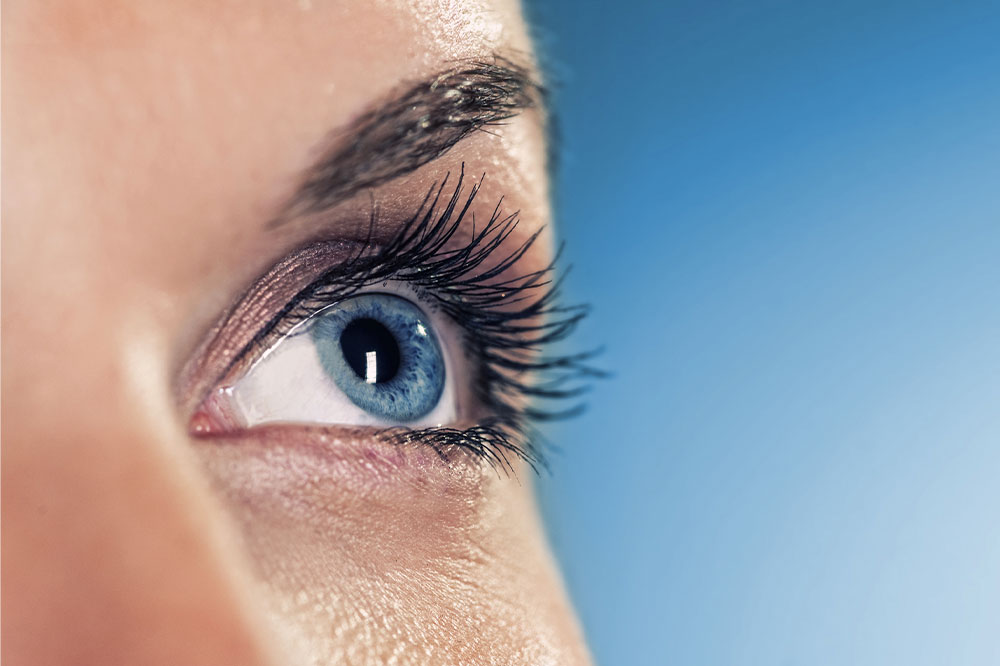4 Vitamins Essential for Eye Health

The eyes are extremely delicate organs that must remain healthy at all times, as once injured, they cannot regenerate or repair. The body requires several vitamins and minerals to maintain clear eyesight and good eye health. So, it is crucial to make better food and lifestyle-related choices to maintain sharp eyesight. While one can choose supplements to avoid nutrient deficiency, vitamin-rich foods are excellent, natural ways to ensure healthy eyes.
Vitamin A
Vitamin A, or retinol, is a fat-soluble vitamin that can be found in two different forms in foods: provitamin A carotenoids and preformed vitamin A. Carotenoids are found in green leafy vegetables, orange and yellow vegetables, tomatoes, and fish oils. Milk and meat products such as liver and fish are excellent sources of preformed vitamin A. This vitamin is an essential component of rhodopsin, a protein in the retina that aids in night vision. Additionally, vitamin A helps in protecting and preserving a clear cornea, the transparent outer surface of the eye. It also protects the eyes against many eye diseases. Studies have shown that maintaining an adequate level of vitamin A in the body can help minimize the chances of developing juvenile blindness and cataract. According to anecdotal evidence, the nutrient appears to reduce the risk of age-related macular degeneration (AMD).
If one is experiencing a persistent deficiency of vitamin A, their tear ducts may dry up. This can lead to the development of irreversible blindness when the cornea eventually weakens. Lubricating eye drops containing vitamin A can help treat dry eye syndrome. Vitamin A deficiency is uncommon, but if left untreated, it can cause xerophthalmia—a serious degenerative eye condition that initially develops as night blindness.
Vitamin C
Vitamin C, a potent anti-oxidant, helps lower oxidative stress in the eyes. The eyes are more vulnerable to free radical damage as more oxygen gets converted into active radicals here. Eyes contain several types of collagen, a protein that provides structural support to the eyes. Vitamin C is crucial for collagen synthesis. The nutrient can also prevent the risk of developing cataracts to some extent. Eyes contain a lubricating fluid called aqueous humor, which is largely composed of vitamin C. A person is more likely to get cataracts when the aqueous humor’s vitamin C concentration depletes at dangerous levels.
Geographic atrophy, a condition caused by the progression of AMD, leads to the loss of retinal cells. Neovascular or wet AMD brought on by fluid from blood vessels leaking into the retina is characterized by the deterioration of retinal cells. By interacting with and neutralizing free radicals, vitamin C helps prevent damage to the photoreceptor cells in the retina and macula. This can stop macular degeneration, which would otherwise cause irreversible visual loss. Age-related macular degeneration has been proven to be slowed down by getting adequate vitamin C along with other crucial nutrients. Oranges, grapefruit, strawberries, tomatoes, red and green peppers, and broccoli are great sources of vitamin C and can be added to meals to meet the daily nutrient requirements.
Vitamin E
The antioxidants associated with vitamin E dissolve or combine with other fat cells as they are fat-soluble. This curbs the breakdown of crucial fatty acids in the retina by free radicals. Observational studies suggest that vitamin E may reduce the risk of cataracts—an eye condition that develops with age. A deficiency of vitamin E can result in many serious eye problems like impaired vision and muscle weakening. Further, the loss of strength in the muscles that control eye movements can sometimes paralyze one or both eyes.
Additionally, severe vitamin E deficiency can cause retinal degeneration and blindness, but it is uncertain whether supplements offer any further benefits if one is getting enough vitamin E from their daily meals. Having said that, vitamin E capsules are frequently recommended to help treat dry eyes. When the eyes do not generate enough tears to keep the surface wet, one can experience a condition called dry eye syndrome. When affected by the disease, one may experience blurry vision, pain, and irritability. Vitamin E can help enhance tear production, thereby alleviating the difficulties of dry eyes and also improving eye health.
Almonds, sunflower seeds, and oils like flaxseed oil are some of the best sources of vitamin E. One can also add other sources like avocados, wheat germ oil, and olive oil to their meals.
Vitamin B complex
Vitamin B complex is a group of B vitamins that are water-soluble. Among the various types of this vitamin, B2, B6, B9, and B12 are the ones crucial for good eye health. These B vitamins protect the eyes from various diseases.
Vitamin B2: Also known as riboflavin, B2 is essential for producing red blood cells. It also acts as an antioxidant, protecting the eyes from damage caused by harmful free radicals. Riboflavin is particularly important for maintaining the health of the cornea, which is the clear outer layer of the eye.
Vitamin B6: Also known as pyridoxine, B6 is important for maintaining the health of blood vessels in the retina—a light-sensitive tissue at the back of the eye.
Vitamin B9: Also known as folic acid, the nutrient promotes cell growth and development. It has been shown to lower the risk of developing age-related macular degeneration, which is a leading cause of vision loss in older adults.
Vitamin B12: Also known as cobalamin, B12 helps one maintain clear eyesight. B12 deficiency can cause damage to the optic nerves, leading to blurred vision.
In addition to helping maintain eye health and eyesight, these four essential vitamins can also help slow the progression of certain eye diseases. Nevertheless, if one notices changes in their vision or eyes, they should consult an ophthalmologist to receive an early diagnosis and appropriate treatment plan. The doctor can recommend treatment options like eye drops, corrective glasses, lifestyle changes, or surgery, depending on the severity of the symptoms.







